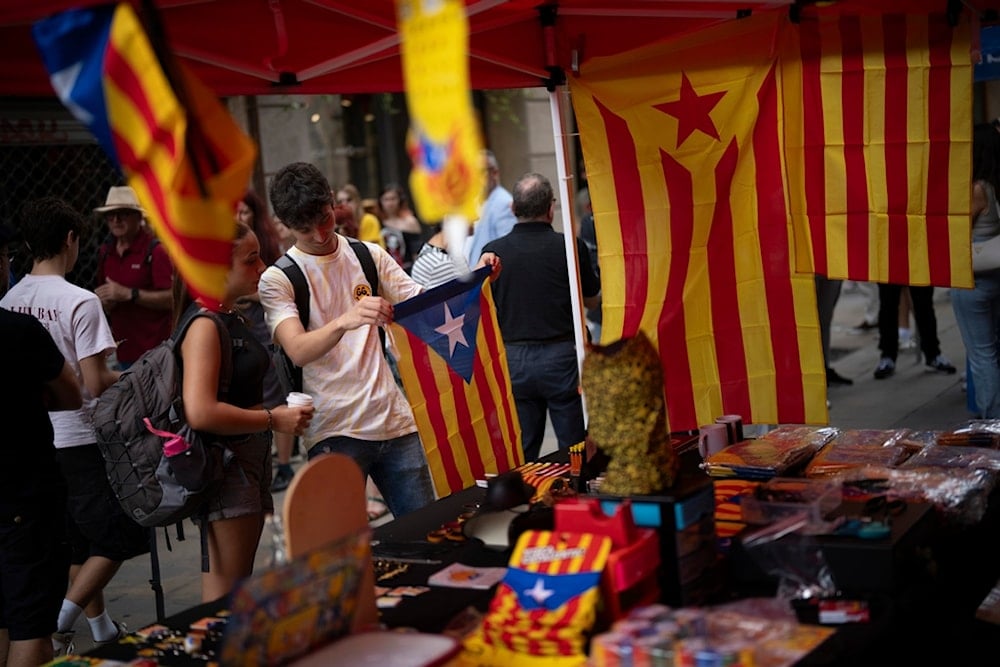Catalonia closes trade office in Tel Aviv over war on Gaza
Catalonia shuts down trade office in Tel Aviv over Gaza war, citing human rights violations and Eurovision controversy.
-

Customers buy an independence flag during the Catalan National Day, during the Catalan National Day, which marks the fall of the Catalan capital to Spanish forces in 1714, in Barcelona, Spain, Wednesday, September 11, 2024 (AP)
The Catalan government announced on Wednesday the immediate closure of its trade office in Tel Aviv, a decision taken in agreement with several local municipalities, according to the Spanish newspaper La Vanguardia.
The move comes amid growing sensitivity within the Catalan administration toward the ongoing atrocities in the Gaza Strip, with the government recently voicing increasingly firm positions regarding the situation.
Outrage over "Israel's" participation in this year’s Eurovision Song Contest also fueled internal backlash, aligning Catalonia’s stance with that of Spanish Prime Minister Pedro Sánchez, who earlier this week called for "Israel" to be excluded from the competition.
Contrast between Russia, 'Israel'
Catalonia’s government, echoing Sánchez’s tone, criticized what it described as “double standards” in how international conflicts are addressed, particularly the contrast between reactions to the war in Gaza and the war in Ukraine.
Speaking at a press conference following a meeting of the Catalan executive council, government spokesperson Sílvia Panique stated, “We are fully committed to human rights, and this double standard surrounding Israel's participation in Eurovision weakens our position.”
Eurovision censors Palestine support
Moreover, a detailed audio analysis conducted by The Intercept has confirmed that booing and shouts of “Free Palestine” were muted from the live Eurovision broadcast during Israeli singer Eden Golan’s performance on May 9, 2024.
Despite repeated denials from the European Broadcasting Union (EBU), the evidence shows that key audience reactions were deliberately scrubbed from the version aired to viewers across the globe.
During Golan’s semifinal performance, which came amid intense global criticism over “Israel’s” ongoing genocide in Gaza, many watching live in the arena booed loudly and chanted in protest. However, viewers of the official Eurovision broadcast heard only applause and cheering.
'Israel' Eurovision controversy, public backlash
Golan later acknowledged the uncomfortable atmosphere during her performance. When shown rehearsal footage featuring heavy booing, she responded, “Well, that happened in every single performance. There were some days that were more extreme.” She added, “I remember not hearing myself, only hearing the boos and the screaming and the yelling.”
Her original song, October Rain, interpreted as a reference to the October 7 operation, was modified and renamed Hurricane to comply with Eurovision’s alleged neutrality rules. Still, calls to bar "Israel" from the competition persisted. Over 56,000 people signed a petition urging its exclusion, while 72 former Eurovision contestants and more than 1,000 Swedish artists demanded a boycott.
The EBU continues to describe Eurovision as a “non-political music event,” with Director General Noel Curran asserting, “It is not a contest between governments.” But critics point to Eurovision's double standards. In 2022, Russia was banned over its military operation in Ukraine. Yet in 2024, despite mounting global outrage over “Israel’s” assault on Gaza, it was allowed to compete.
The broadcast was produced by Sweden’s SVT, which mixed the final stereo audio used in the satellite feed distributed to participating countries. While some broadcasters have access to raw audio channels, including separate feeds for performers, crowd reactions, and commentary, most rely on the pre-packaged version.

 3 Min Read
3 Min Read










